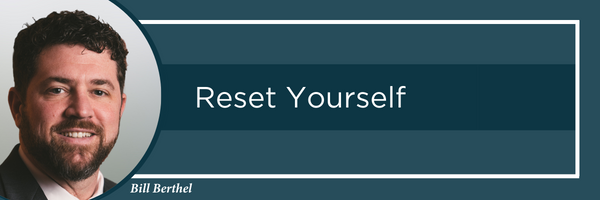During a meeting with local health leaders, I noticed an interesting phenomenon: compassion fatigue. Burnout is common in healthcare, and the pandemic added untold stress to health workers around the world. But in addition to facing long hours and near-daily traumas, doctors and nurses are also expected to show empathy and compassion to millions of scared patients, along with their families. Many people get into healthcare to provide this sort of care, to soothe minds and heal bodies. But many reach the point where they’re not sure how much left they have to give.
Each of us feels this about our jobs sometimes, even if the stakes are much lower. We might feel a tiny tinge of dread on the commute to work, or confide to our friends that our heart just isn’t in it anymore. Staying is wearisome, but change is scary. So, we become content with our discontent.
But what if it were possible to change our minds about the situation? What if we could recommit?
Think back to a job offer you were truly excited to receive. Immediately, you were imagining yourself in your new role. You were optimistic about your future with the company and believed you would be happy there.
Then you walked into the office on the first day, and the reality of the job gradually began to replace your vision of it. Your coworkers became real people, not hypotheticals; the projects and meetings and deadlines started taking up more space until they defined your idea of the job. After a while, you realized how far reality had strayed from your predictions. Your optimism seemed strange and naive in retrospect.
This sounds like disenchantment, and it may well be, but it’s also a natural and healthy process. We change our expectations when confronted with new information. However, if left unchecked, dissatisfaction can cause us to forget why we wanted the job in the first place. The good news is, we can always begin again.
If you’re feeling dissatisfied, take a strategic pause. Breathe deep, and imagine an ideal version of your current job. What would it look like? Would you be in the same role? How would your relationships with your coworkers be different? What would it feel like when you got in your car in the morning to head to the office?
Spend some time in this imaginary world. Focus on the feelings at first, and then on the specific differences between the real and the ideal. Then, begin to identify what you have the power to change. Don’t forget that you are an agent–you can’t control your environment, but you can influence it. Through sustained action, you can align your current role more closely with what you have envisioned, and recapture that old optimism. It won’t be naive anymore.
We call this practice image ideal leadership. The very act of imagining a better situation gets the gears turning. But sustained momentum requires a plan. Take some of the gaps you’ve identified and brainstorm ways to close them. Set some goals. The change won’t come all at once, but a clear vision and consistent action will bring you closer to your ideal image. Identify, imagine, and act.
Sometimes, it’s difficult to get out of your own head. Small groups are fantastic venues for image ideal practices. New ideas and fresh takes can unclog the mind, and including other people in the process helps generate accountability.
Don’t be afraid to begin again. Recommitting to your work can be as simple as a slight change in mindset. It’s always possible to make a change, provided you’re willing to use some imagination.
This blog draws on ideas discussed in an episode of the Get Emergent podcast I recorded with Ralph Simone. For more advice on this important subject, listen to the episode here. If you want us to help you on your journey toward an engaged and exciting work life, don’t hesitate to contact me at [email protected].

Comments (3)
Thanks for this Bill. What perfect timing for such a profound message! Your mind is a powerful tool when used in a healthy way.
We find it tough to change with the same routine’s day in and day out. Great idea to stop and think about how things can be and get better.
Great perspective. Pausing to think about things in a positive light and envisioning how you, as an individual, can improve them is a much better path than focusing on a current state you are dissatisfied with.